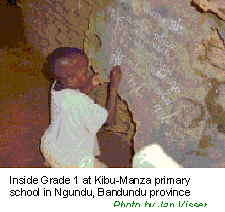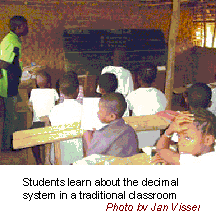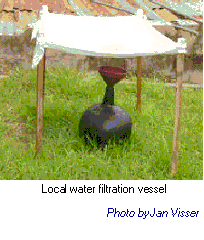Risk and Innovation for Improved Education in the Democratic Republic of Congo (DRC)
February 2003, Kinshasa
The modest infrastructure that the Belgian colony left behind is gone. Internal conflict and poverty have taken their toll, and what remains is a majority of people who function without paved roads, electricity or running water. Political struggles for power and resources have rendered government health and education provision nearly obsolete. In many cases, villages and communities have been left to their own devices.
“Parents will sell their only goat and few household goods so that their sons can go to school,” says Sonia Arias, a Project Director for the DRC’s dot-EDU Basic Education project. The poorest segments of the population often pay for teachers’ salaries, school buildings, and administrators’ offices to compensate for suspended government support.
Yet Congolese parents, teachers and administrators have not given up. They pool their meager resources so that the educational apparatus, despite its imperfections, can operate. This monumental effort is possible in large part due to the various religious groups and missionaries who provide some structure to the educational system in Congo. A testament to the human spirit can be observed--Protestants and Catholics working together in a coordinated fashion to bring some form of education to the Congolese people. However, these efforts are not enough.

In one classroom students gaze passively at the chalkboard as the teacher uses numeric and theoretical concepts to explain the decimal system—a teaching strategy that in no way relates to the students’ daily lives. Poorly trained and often unmotivated teachers have not yet learned how to use examples found in the immediate environment to illustrate principles of math, health, agriculture and even physics. School conditions are inadequate; students of the lower grades sit cramped together on long benches, with no books or desks to write on. Teachers work without handbooks. According to Sonia Arias, “a single dictionary in a school is considered a luxury.”
Traditional methods of remedying this educational crisis require a generation of effort and funding free of political instability. However, Congo does not have the luxury to wait that long. USAID’s DRC Mission Director, Tony Gambino, put the following challenge to the Education Development Center (EDC): leverage risky and innovative opportunities that digital and broadcast technologies offer in order to bring about improved quality and increased access to education.

EDC and the Academy for Educational Development (AED) began work in late Fall 2002 with the Vanga community in Bandundu Province. Vanga, though geographically isolated, is a vibrant health and educational community. Long-standing missionary presence and strong community leadership has given rise to a network of schools and health service centers. Working within a community ownership model, a fully operational Community Learning and Resource Center will provide access to information technology and training in information literacy skills, learning materials development and project-based learning methods relevant to the Vanga community. Classroom instruction in such areas as nutrition, agriculture and language instruction will be supported by test interventions using information technologies.
Establishing a telecenter with 15 computers when there is no power in the midst of an agrarian, mostly illiterate community is indeed risky. But the Vanga community has already come together for the common goal of improving and developing their community. The learning materials, information literacy skills and community learning projects developed will lay the groundwork for the educational development of future generations.

In Luozi, another territory without electricity or telephone lines, it would seem any technological project would have to start at zero. However, the Luozi community’s dynamism and active participation in the change process provide fertile ground for creative innovation--using the most advanced learning technologies available. The key to success is the “community of practice” approach, which promotes collaboration among teachers to apply methods that inspire learning in students and gain support from parents. Learning will be enhanced through the use of local resources and equipment (like sugar cane and palm oil presses to discuss physics and income generation), and a life skills curriculum will be broadcast via radio.
The challenges to the Vanga and Luozi projects should not be ignored. A lack of transportation and communications infrastructure, poor health and sanitary conditions, food insecurity, limited economic development, gender disparity and little government support are just a few difficulties that have prevented sustainable development from taking root. It is hoped that the innovative nature of this dot-EDU project will begin to empower local communities to break the cycle of poverty and create real opportunities for all involved.
For more information, please contact:
- EDC Project Director, Sonia Arias, sarias@edc.org
- EDC Project Coordinator, Konjit Hailu, khailu@edc.org
